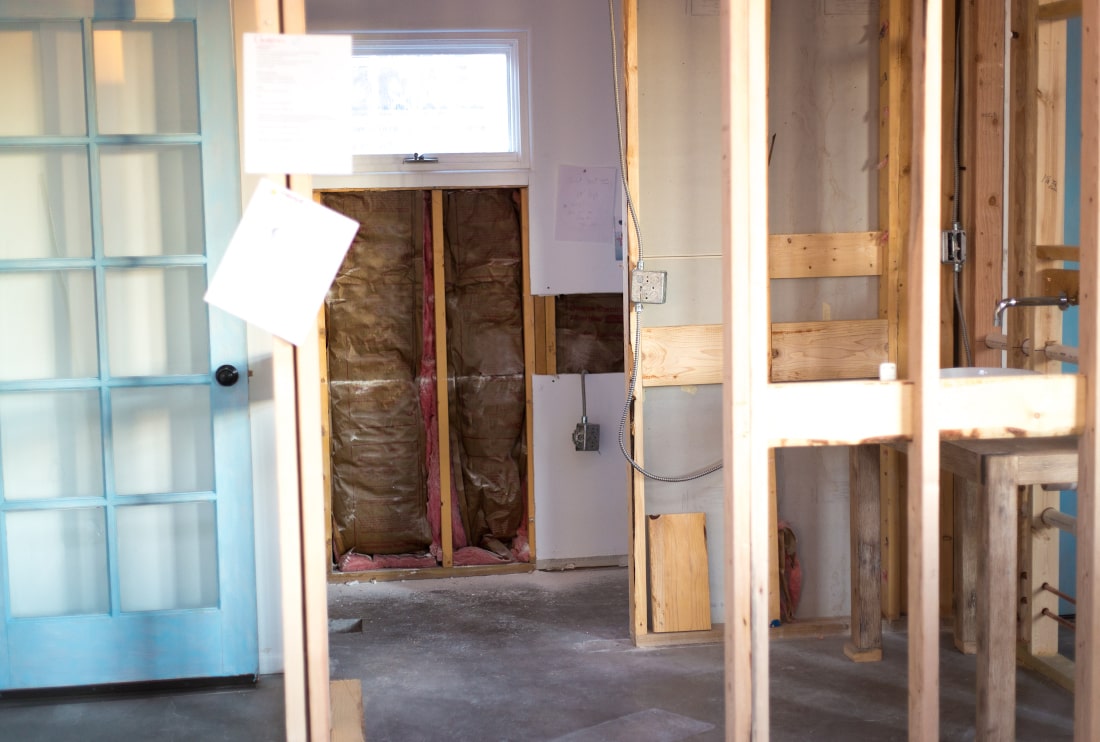
05 Feb Is it Illegal to Finish a Basement Without a Permit?
Finishing a basement is often seen as a fantastic opportunity for Canadian homeowners to maximize their living space, increase property value, and create a more functional home environment. However, amidst the excitement of planning and envisioning the perfect basement renovation, the importance of obtaining permits can sometimes be overlooked.
Many homeowners may wonder whether it’s truly illegal to proceed with finishing their basement without securing the necessary permits.
Understanding Building Permits
Before diving into the legality of finishing a basement without a permit, it’s crucial to grasp the essence of building permits.
In Canada, building permits serve as official authorization from local municipalities, ensuring that construction projects comply with safety codes, zoning regulations, and other legal requirements. They are typically required for any significant alterations or additions to a property, including basement renovations.
These permits play a vital role in safeguarding the structural integrity of buildings and the well-being of their occupants.
Legal Ramifications of Omitting Permits
For many homeowners, a pressing inquiry arises: could one face legal repercussions for finalizing a basement without the requisite permits? The resounding answer rests in the affirmative—it may indeed transgress legality.
While building codes and ordinances fluctuate amid provinces and municipalities in Canada, the aftermath of evading permits for basement finalization can be dire. Homeowners hazard encountering fines, penalties, and potentially directives to dismantle or reverse the unauthorized endeavours.
Moreover, insurance indemnification pertinent to damages linked with unpermitted revamps might face denial, thus leaving homeowners financially precarious and exposed.
Security Concerns
Beyond the juridical ramifications, fundamental safety considerations are tethered to finalizing a basement without the requisite permits.
Building codes are meticulously honed to guarantee the structural robustness of properties and the well-being of their residents. In the absence of proper scrutiny and oversight, inferior construction methodologies could imperil structural integrity, culminating in risks such as structural collapses, electrical perils, and fire hazards.
Through procuring permits and steadfastly adhering to code prerequisites, homeowners can assuage these perils and cultivate a more secure living space.
Advantages of Procuring Permits
Many benefits accrue from acquiring permits for basement refurbishments.
Firstly, permits furnish homeowners with the reassurance that their endeavour aligns with stringent safety benchmarks and regulatory requisites. Secondly, official permits could substantially augment the resale value of the premises, as prospective purchasers often accord precedence to properties endowed with documented adherence.
Additionally, permits facilitate communication with contractors and inspectors, thereby streamlining the construction trajectory and curtailing the prospect of altercations or postponements.
Navigating the Permitting Process
Acquiring permits for basement finalization entails a sequence of maneuvers, contingent on variables like locale, project expanse, and regional statutes.
Customarily, homeowners are obliged to compile meticulous blueprints and specifications, tender applications to the local building authority, remit pertinent fees, and undergo inspections at varied stages of implementation.
While the permitting procedure might loom as daunting, municipalities tender resources and counsel to aid homeowners in efficaciously navigating it.
Additional Insights for Basement Revamps
Amidst the legalities and permitting intricacies, several supplementary considerations warrant homeowners’ attention whilst contemplating a basement refurbishment.
- Moisture Management: Basements are inherently predisposed to moisture encumbrances, which could precipitate mould, odours, and structural impairment. Before starting refurbishments, it is imperative to scrutinize and mitigate moisture issues. This could entail ameliorating drainage, sealing crevices, installing vapour barriers, and ensuring adequate ventilation to catalyze airflow and prevent condensation.
- Insulation and Energy Efficiency: Adequate insulation is pivotal for preserving ambient temperatures and bolstering energy efficiency within a finalized basement. Through insulating exterior walls, flooring, and ceilings, homeowners could curtail heat dissipation, truncate energy consumption, and augment overall comfort. Moreover, investments in energy-efficient windows and doors could further refine insulation and engender enduring energy savings.
- Soundproofing: Basements frequently double as versatile spaces accommodating activities such as home theatres, exercise studios, or music chambers, mandating sound insulation to preclude auditory dispersion. Integration of soundproofing modalities such as acoustic panels, dual-layer drywall, and resilient channelling could nurture a serene and pleasurable milieu for both occupants and neighbours.
- Egress Mandates: Numerous jurisdictions mandate explicit egress requisites for basement bedrooms or living quarters to ensure secure evacuation during exigencies. This typically encompasses installing adequately sized windows or doors affording direct ingress to the exterior. Homeowners contemplating the inclusion of bedrooms or habitation zones in their basement ought to acquaint themselves with these requisites and assure compliance throughout the renovation.
- Structural Deliberations: Basement refurbishments might entail structural alterations such as wall removals, bolstering support beams, or reconfiguring the layout to accommodate novel features or amenities. It is imperative to solicit counsel from a seasoned structural engineer or contractor to assess the structural integrity of the foundation and pinpoint any reinforcements or modifications to substantiate the planned alterations safely.
Ultimately, the question of whether it’s illegal to finish a basement without a permit is one that Canadian homeowners cannot afford to overlook. While it may be tempting to expedite the renovation process by sidestepping permits, doing so can have far-reaching legal, financial, and safety implications.
By obtaining the necessary permits and adhering to building codes, homeowners can ensure that their basement renovations are conducted safely, legally, and to the highest standards, thereby safeguarding their investment and well-being for years to come.
Are you contemplating a basement renovation project? Don’t underestimate the importance of permits. Reach out to Penguin Basements today for expert guidance and support with your basement renovation endeavours. Our seasoned professionals can navigate the permitting process on your behalf, ensuring compliance with all relevant regulations while bringing your basement vision to life.
Visit our website or give us a call now to embark on your journey toward a beautifully finished basement that’s both legal and safe!
Christian Saunders, a seasoned marketing professional hailing from Toronto, Ontario, brings over 5 years of valuable experience to our team.
As a key member of our company, Christian plays a pivotal role in crafting compelling content that you encounter on our website and social media platforms. With a keen eye for detail and a passion for effective communication, Christian ensures that our brand's message resonates with our target audience. Beyond his desk, you might spot Christian on our job sites, skillfully capturing multimedia to enhance our visual storytelling.
Don't hesitate to say hello when you see him in action! Christian's dedication and expertise contribute significantly to our mission of delivering exceptional experiences to our valued clients.




